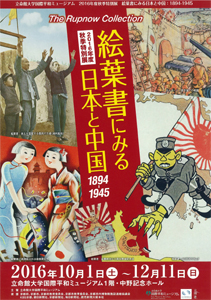Purpose of Exhibition
For roughly half a century, from the start of the First Sino-Japanese War until the end of World War II, Japan launched an invasion into Mainland China that eventually erupted into a full blown war of aggression that Japan ultimately lost. During this period, how did Japan and China perceive each other; how did the rest of the world see them? This exhibit tries to reveal how historical events that deal with Japan and China such as the First Sino-Japanese War, Russo-Japanese War, Boxer Rebellion, Twenty-One Demands, Paris Peace Conference, Manchurian Incident and Second Sino-Japanese War were portrayed in postcards and other materials.
This is the first time that this collection of postcards from world renowned postcard collector Donald Rupnow will be publicty displayed in Japan. Mr. Rupnow's collection serves as the centerpiece of this exhibit offering up many fascinating images. The exhibit also displays many materials that were used for propaganda during the war as well as war theme kimono and other textiles. We hope this exhibit will give people the opportunity to think about some of the issues that still continue to put strain on Japan-China relations.
| Period |
October 1 (Sat) - December 11 (Sun) |
| Open |
From 9:30 to 16:30 (No admission after 16:00.) |
| Closed |
Every Monday (except Monday, October 10), October 11 (Tue), November 4 (Fri), November 24 (Thu) |
| Venue |
Nakano Memorial Hall, Kyoto Museum for World Peace, Ritsumeikan University |
| Admission |
Adults 400 yen (350 yen), Junior and senior school students 300 yen (250 yen), Elementary school students 200 yen (150 yen)
*The prices shown in ( ) are for groups of 20 or more.
*Permanent exhibitions are included in the admission fee.
*Admission is free on November 19 (Sat) and 20 (Sun) for Kansai Culture Days.
* Admission is free for students, faculty and staff of Ritsumeikan. |
| Organizer |
Kyoto Museum for World Peace, Ritsumeikan University |
| With the Support of |
Kyoto Prefecture, City of Kyoto, Kyoto Prefectural Board of Education, Kyoto City Board of Education
Kyoto Shinai Hakubutsukan Shisetsu Renraku Kyougikai, KBS Kyoto, Asahi Shimbun
Kyoto Shimbun, Mainichi Shimbun, Yomiuri Shimbun |
| Special Lecture Traveling Through the Empire of Japan Via Postcards - Japan-China Relations and the Japanese |
Date & Time
|
Saturday, October 29, 2016 1:30 p.m. - 3:00 p.m. |
| Venue |
Museum Conference Room 2F, Kyoto Museum for World Peace |
| Lecturer: |
Hiroki Futamatsu (Visiting Scholar, Institute of Social Systems, Ritsumeikan University) |
| Application |
Participation fee and advance application not required |
| Capacity |
80 |
| Organizer |
Kyoto Museum for World Peace, Ritsumeikan University |
| Hiroki Futamatsu |
Born in the City of Kyoto in 1969, Mr. Futamatsu completed his Master's degree in Social Welfare at Doshisha University, later becoming a journalist for the Cultural Section of the Kyoto Shimbun.
After meeting a Japanese women who was left behind in China after Japan's withdrawal from the war, he has been reporting on such things as Japanese who emigrated to Manchuria and Mongolia to establish farms and Japanese prisoners of war in the Soviet Union since 2003. In addition to various long running serialized works such as "Fuinsareta Manshuu" (Sealed Manchuria) and "Shizumaranu Manshuu" (Restless Manchuria) in the Kyoto Shimbun (newspaper), he has also written articles for "Nakihito tono Katarai" (Speaking with the Dead), observations dealing with end-of-life care and death, and "Chinmoku to Kizuato to" (Silence and Scars), accounts of families dealing with loved ones who have fallen into a persistent vegetative state. Currently, Mr. Futamatsu is in charge of the medical care section of the newspaper.
He has also published the books "Sakareta Daichi -- Kyoto Manshuu Kaitakumin Kiroku Nakirekishi" (Torn Earth -- Accounts of Kyoto Farmers Sent to Manchuria) and "Imintachi no Manshuu -- Mamou Kaitakudan no Kyo to Jitsu" (Immigrants of Manchuria -- Truth and Lies of the Farmers Sent to Manchuria and Mongolia), as well as co-authored "Nyugan no Arukikata -- Yomei wo Ikiru 50 no Monogatari" (Walking with Breast Cancer -- 50 Stories About Living Out the Rest of Life)
|
